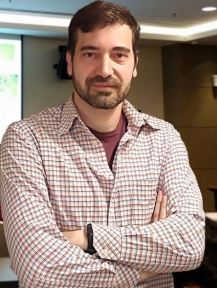INSTITUTE SEMINAR
Custom neuron subtypes engineering from adult neural progenitors
Speaker
Sergio Gascón
Date and time
March 31 2023 12:30
Place
Instituto Cajal
Abstract
Recent discoveries in the field of cell reprogramming have contributed to identify key players in the complex mechanisms that control the generation of different neuronal subtypes during development. However, we still know little about how neuronal identities are acquired, maintained and deleted. In this study we investigate whether neuronal progenitors from the adult subependymal zone (SEZ) and their GABAergic progeny can be respecified towards a glutamatergic identity, in response to the glutamatergic determinant Neurog2. We found that, upon the expression of this transcription factor, SEZ neuronal stem cells that normally give rise to ABAergic olfactory bulb interneurons, change their fate and differentiate into glutamatergic neurons. In contrast, Neurog2 failed to alter the identity of already committed neuroblasts, which remained GABAergic. Thus, our results suggest that while adult neural stem cells still exhibit lineage plasticity and can change their identity, in the already compelled adult neuronal progenies, strong epigenetic barriers impede their conversion towards alternative neuronal subtypes.
Affiliation and short bio

Sergio Gascón carried out his PhD studies (Institute for Biomedical Research-Alberto Sols, Madrid) on the topic of glutamate NMDA receptors and other interacting postsynaptic proteins that are involved in cerebrovascular diseases. During this time, he carried out research stays at the previous laboratory of Peter Scheiffele (2003/2004, Columbia University, New York), to develop lentiviral vectors for the efficient gene expression in
neurons. After completing his PhD (2007, Autónoma University of Madrid), Sergio moved to the laboratory of Magdalena Götz (Ludwig Maximilian University, Munich), where he focused on the neuronal reprogramming field. Sergio participated in the first article demonstrating that astroglia can be reprogrammed into fully functional neurons and, in his main study, he identified metabolic constraints blocking the neuronal conversion process. Moreover, Sergio’s research also addressed fundamental questions regarding the stem cell potential of reactive glial cells, and the mechanisms of neurogenesis. Sergio secured a competitive RyC position in 2017, and his research team, at the Cajal Institute-CSIC (Madrid), focuses on new strategies to improve neuronal reprogramming and to develop human models of brain diseases in vitro.
Related publications with the topic
Peron S*, Brill M*, Miyakoshi L*, Ortega F, Manzano D, Gascón S§ɸ, Berninger B§ɸ. Programming of neural progenitors of the adult subependymal zone towards a glutamatergic identity by Neurog2. (Stem Cell Reports, in revision). Preliminary version already available at:
http://www.biorxiv.org/content/early/2017/08/03/171686.full.pdf+html Gascón S*, Masserdotti G*, Russo G*, Götz M. Direct neuronal reprogramming – achievements, hurdles and new roads to success. Cell Stem Cell (IF23.29). 2017 Jul 6;21(1):18-34. doi: 10.1016/j.stem.2017.06.011. doi: 10.1016/j.stem.2017.06.011.
